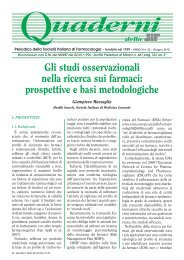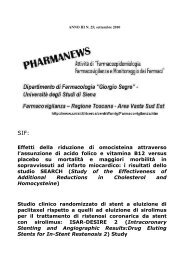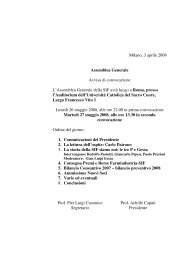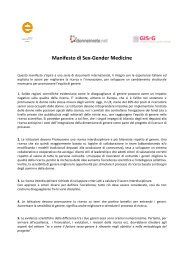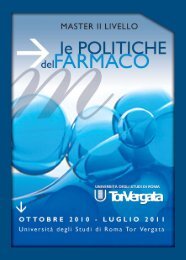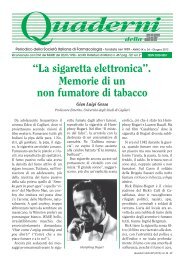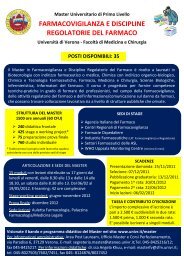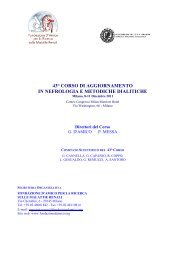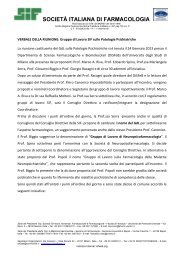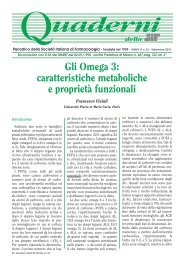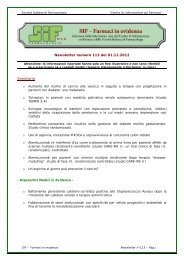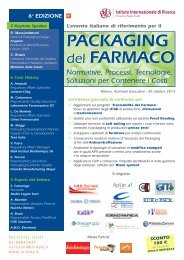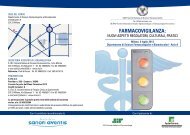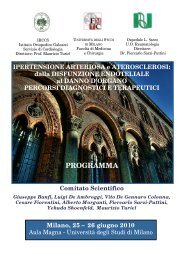scienze della vita roma, 22-23 ottobre 2012 - SIF
scienze della vita roma, 22-23 ottobre 2012 - SIF
scienze della vita roma, 22-23 ottobre 2012 - SIF
Create successful ePaper yourself
Turn your PDF publications into a flip-book with our unique Google optimized e-Paper software.
NRF2 TRANSCRIPTION FACTOR ACTIVATION MODULATES<br />
ENDOTHELIAL INFLAMMATORY RESPONSE TRIGGERED<br />
BY TNF-ALPHA<br />
Antonio Speciale*, Sirajudheen Anwar*, Deborah Fratantonio*, Andrea Azzerboni***, Antonella<br />
Saija*, Fabio Virgili**, Francesco Cimino*<br />
*Dep. Farmaco-Biologico, School of Pharmacy, University of Messina, Viale Annunziata, 98168,<br />
Messina, Italy<br />
**National Research Institute on Food and Nutrition (INRAN), Rome, Italy<br />
***OU of Obstetrics & Gynecology, Policlinico Universitario “G. Martino”, Messina, Italy<br />
Oxidants are one of the etiologies of multiple diseases and disorders. Cells are continously exposed<br />
to the deleterious consequences of reactive oxigen species generated endogenously and<br />
exogenously. However, cells have developed multiple stress adaptive responses, including the<br />
system regulated by the transcription factor Nrf2 that modulates a set of cytoprotective genes (such<br />
as HO-1, NQO1, -GCS). Up today there are few data supporting the atheroprotective and antiinflammatory<br />
activity of the Nrf2 pathway in endothelial cells. Since activation of endogenous<br />
cellular defense mechanisms can represent an innovative approach to therapeutic intervention in<br />
pathological conditions characterized by chronic tissue damage, a better understanding of adaptive<br />
response mechanisms at the cellular and molecular levels can lead to novel strategies for the<br />
prevention and treatment of many different diseases. Thus, to test the potential atheroprotective and<br />
anti-inflammatory role of the Nrf2 pathway we have investigated if some changes in the<br />
intracellular redox status, such as those related to endogenous antioxidants depletion, might be able<br />
to alter the response to the inflammatory cytokine TNF-α in cultured human endothelial cells<br />
through the activation of this pathway.<br />
In this study, we revealed that an oxidative intracellular status consequent to an intracellular<br />
glutathione depletion induced by HUVECs exposure to buthionine sulfoximine (BSO), an inhibitor<br />
of -glutamylcysteine synthetase ( -GCS), a rate-limiting enzyme in glutathione biosynthesis, is<br />
able to induce a cellular adaptive response. Interestingly we demonstrated that, in our experimental<br />
conditions, activation of Nrf2 pathway is able to reduce endothelial dysfunction by decreasing NFkB<br />
nuclear translocation and adhesion molecules gene expression in HUVECs. Furthermore, we<br />
confirmed that Nrf2 nuclear translocation activated by GSH depletion is dependent on extracellular<br />
signal-regulated kinases 1/2 phosphorylation. In conclusion, we showed that the coordinate<br />
induction of endogenous cytoprotective proteins through activation of the Nrf2 pathway might serve<br />
as a new therapeutic approach for prevention or treatment of endothelial dysfunction.<br />
Corresponding author: Antonio Speciale (specialea@gmail.com)<br />
67



